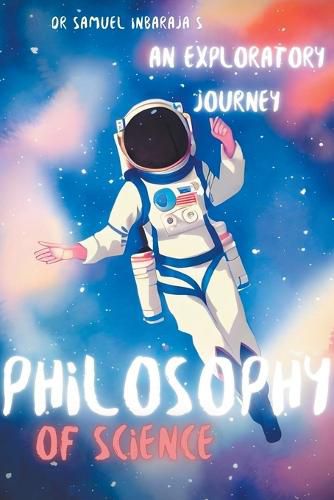Readings Newsletter
Become a Readings Member to make your shopping experience even easier.
Sign in or sign up for free!
You’re not far away from qualifying for FREE standard shipping within Australia
You’ve qualified for FREE standard shipping within Australia
The cart is loading…






This title is printed to order. This book may have been self-published. If so, we cannot guarantee the quality of the content. In the main most books will have gone through the editing process however some may not. We therefore suggest that you be aware of this before ordering this book. If in doubt check either the author or publisher’s details as we are unable to accept any returns unless they are faulty. Please contact us if you have any questions.
Embark on a comprehensive journey through the intricate landscape of scientific thought in "Philosophy of Science: An Exploratory Journey". This in-depth guide takes readers from the rudimentary tenets of philosophy of science to the pivotal concepts that define and differentiate science from non-science.
The book explores the fine balance between science and scientism, offering insight into the unique methodologies that shape scientific inquiry. It navigates through the origins, applications, advantages, and disadvantages of Methodological Naturalism, and dives deep into the realm of causality, shedding light on the primary and secondary causes producing effects.
An essential feature of the book is its exploration of various hypotheses and theories, including Inference to the Best Explanation (IBE), the logic of scientific discovery, and Falsificationism, inspired by Karl Popper. Moreover, it introduces readers to the interplay of Rationalism and Empiricism and the dance of Methodological Anarchy.
The book traces the history and evolution of the philosophy of science, from the Scientific Revolution to the emergence of modern science. It discusses the role of universities and the World Wars, the advent of modern medicine, and the transformation of health and well-being.
As it progresses, the book delves into the assumptions underpinning scientific knowledge, the beginnings of empirical science, and the concept of natural laws. A detailed exploration of Francis Bacon's method of empirical science and its criticisms provides an excellent historical context.
The latter part of the book deals with the spectrum between Realism and Anti-realism, discussing various perspectives such as Naive Realism, Ontic Structural Realism, Entity Realism, Epistemic Structural Realism, and others. It investigates the case for both scientific anti-realism and realism, leading to a comprehensive understanding of the Realism-Anti-Realism spectrum.
Further, it explores the intersection between science and theistic philosophy, predicting the future of the philosophy of science. The final chapters tackle Quantum Mechanics' impact on the Realism-Anti-Realism spectrum, the Correspondence and Coherence theories, and the influence of bias and randomization in scientific knowledge.
"Philosophy of Science: An Exploratory Journey" is a must-read for students, educators, researchers, and anyone interested in understanding the philosophical foundations that guide scientific inquiry. This book is a valuable resource that encourages readers to reflect on the principles and practices that define and drive the scientific community.
$9.00 standard shipping within Australia
FREE standard shipping within Australia for orders over $100.00
Express & International shipping calculated at checkout
This title is printed to order. This book may have been self-published. If so, we cannot guarantee the quality of the content. In the main most books will have gone through the editing process however some may not. We therefore suggest that you be aware of this before ordering this book. If in doubt check either the author or publisher’s details as we are unable to accept any returns unless they are faulty. Please contact us if you have any questions.
Embark on a comprehensive journey through the intricate landscape of scientific thought in "Philosophy of Science: An Exploratory Journey". This in-depth guide takes readers from the rudimentary tenets of philosophy of science to the pivotal concepts that define and differentiate science from non-science.
The book explores the fine balance between science and scientism, offering insight into the unique methodologies that shape scientific inquiry. It navigates through the origins, applications, advantages, and disadvantages of Methodological Naturalism, and dives deep into the realm of causality, shedding light on the primary and secondary causes producing effects.
An essential feature of the book is its exploration of various hypotheses and theories, including Inference to the Best Explanation (IBE), the logic of scientific discovery, and Falsificationism, inspired by Karl Popper. Moreover, it introduces readers to the interplay of Rationalism and Empiricism and the dance of Methodological Anarchy.
The book traces the history and evolution of the philosophy of science, from the Scientific Revolution to the emergence of modern science. It discusses the role of universities and the World Wars, the advent of modern medicine, and the transformation of health and well-being.
As it progresses, the book delves into the assumptions underpinning scientific knowledge, the beginnings of empirical science, and the concept of natural laws. A detailed exploration of Francis Bacon's method of empirical science and its criticisms provides an excellent historical context.
The latter part of the book deals with the spectrum between Realism and Anti-realism, discussing various perspectives such as Naive Realism, Ontic Structural Realism, Entity Realism, Epistemic Structural Realism, and others. It investigates the case for both scientific anti-realism and realism, leading to a comprehensive understanding of the Realism-Anti-Realism spectrum.
Further, it explores the intersection between science and theistic philosophy, predicting the future of the philosophy of science. The final chapters tackle Quantum Mechanics' impact on the Realism-Anti-Realism spectrum, the Correspondence and Coherence theories, and the influence of bias and randomization in scientific knowledge.
"Philosophy of Science: An Exploratory Journey" is a must-read for students, educators, researchers, and anyone interested in understanding the philosophical foundations that guide scientific inquiry. This book is a valuable resource that encourages readers to reflect on the principles and practices that define and drive the scientific community.